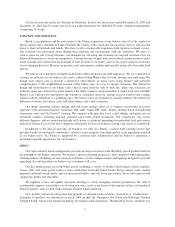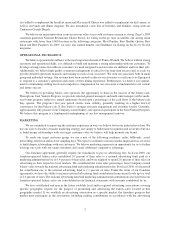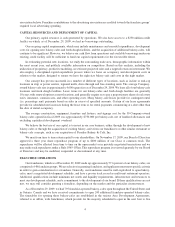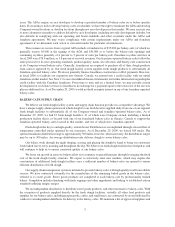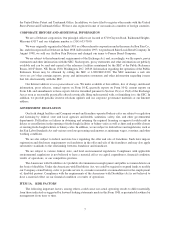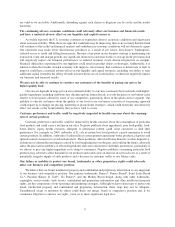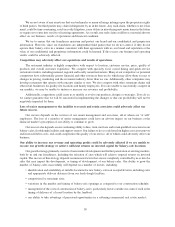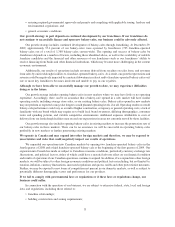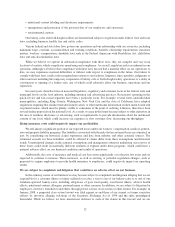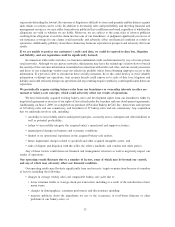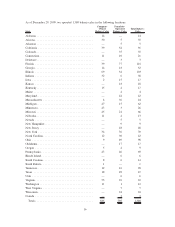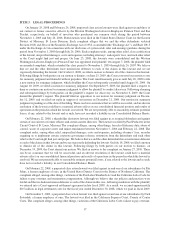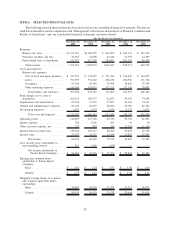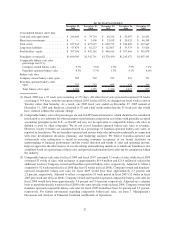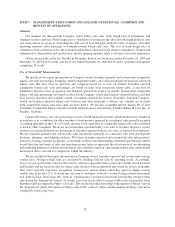Panera Bread 2009 Annual Report Download - page 18
Download and view the complete annual report
Please find page 18 of the 2009 Panera Bread annual report below. You can navigate through the pages in the report by either clicking on the pages listed below, or by using the keyword search tool below to find specific information within the annual report.•nutritional content labeling and disclosure requirements;
•management and protection of the personal data of our employees and customers;
•environmental matters.
Our bakery-cafes and fresh dough facilities are licensed and subject to regulation under federal, state and local
laws, including business, health, fire and safety codes.
Various federal and state labor laws govern our operations and our relationship with our associates, including
minimum wage, overtime, accommodation and working conditions, benefits, citizenship requirements, insurance
matters, workers’ compensation, disability laws such as the Federal Americans with Disabilities Act, child labor
laws and anti-discrimination laws.
While we believe we operate in substantial compliance with these laws, they are complex and vary from
location to location, which complicates monitoring and compliance. As a result, regulatory risks are inherent in our
operation. Although we believe that compliance with these laws has not had a material effect on our operations to
date, we may experience material difficulties or failures with respect to compliance in the future. Our failure to
comply with these laws could result in required renovations to our facilities, litigation, fines, penalties, judgments or
other sanctions including the temporary suspension of bakery-cafe or fresh dough facility operations or a delay in
construction or opening of a bakery-cafe, any of which could adversely affect our business, operations and our
reputation.
In recent years, there has been an increased legislative, regulatory and consumer focus at the federal, state and
municipal levels on the food industry, including nutrition and advertising practices. Restaurants operating in the
quick-service and fast-casual segments have been a particular focus. For example, several states and individual
municipalities, including King County, Washington, New York City and the state of California, have adopted
regulations requiring that chain restaurants include caloric or other nutritional information on their menu boards and
on printed menus, which must be plainly visible to consumers at the point of ordering. Likewise, there have been
several similar proposals on the national level. As a result, we may in the future become subject to other initiatives in
the area of nutrition disclosure or advertising, such as requirements to provide information about the nutritional
content of our food, which could increase our expenses or slow customer flow, decreasing our throughput.
Rising insurance costs could negatively impact our profitability.
We self-insure a significant portion of our expected losses under our workers’ compensation, medical, general,
auto and property liability programs. The liabilities associated with the risks that are retained by us are estimated, in
part, by considering our historical claims experience and data from industry and other actuarial sources. The
estimated accruals for these liabilities could be affected if claims differ from these assumptions and historical
trends. Unanticipated changes in the actuarial assumptions and management estimates underlying our reserves of
these losses could result in materially different amounts of expense under these programs, which could have a
material adverse effect on our financial condition and results of operations.
Additionally, the costs of insurance and medical care have risen significantly over the past few years and are
expected to continue to increase. These increases, as well as existing or potential legislation changes, such as
proposals to require employers to provide health insurance to employees, could negatively impact our operating
results.
We are subject to complaints and litigation that could have an adverse effect on our business.
In the ordinary course of our business we may become subject to complaints and litigation alleging that we are
responsible for a customer illness or injury suffered at or after a visit to one of our bakery-cafes or to one of our
franchise-operated bakery-cafes, including allegations of poor food quality, food-borne illness, adverse health
effects, nutritional content, allergens, personal injury or other concerns. In addition, we are subject to litigation by
employees, investors, franchisees and others through private actions, class actions or other forums. For example, in
January 2008, a purported class action lawsuit was filed against us and three of our current or former executive
officers by investors alleging violations of the Securities Exchange Act of 1934 and the rules promulgated
thereunder. While we believe we have meritorious defenses to each of the claims in this lawsuit and we are
12


